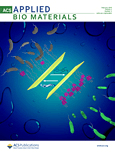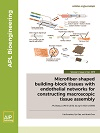
BIOMEDICAL MICRODEVICES
metrics 2024
Fostering Collaboration in Biomedical Microdevice Research
Introduction
BIOMEDICAL MICRODEVICES is a leading journal published by Springer that focuses on the innovative field of microdevices within biomedical engineering. With an ISSN of 1387-2176 and an E-ISSN of 1572-8781, BIOMEDICAL MICRODEVICES offers a prestigious platform for researchers to disseminate their findings from 1998 to 2024, demonstrating a long-standing commitment to advancing knowledge in this critical area. The journal is recognized for its significant contributions, boasting a Q2 ranking in Biomedical Engineering and Nanoscience and Nanotechnology, and a Q3 rank in Molecular Biology. Renowned for its rigorous peer-review process, it is positioned within the top 30% of its field according to Scopus rankings, making it a valuable resource for researchers and practitioners alike. Though it operates under a subscription model, the emphasis on quality and relevance within its scope ensures that BIOMEDICAL MICRODEVICES remains a vital source of cutting-edge research that bridges engineering and biological systems, fostering innovation and collaboration in the pursuit of novel health solutions.
Metrics 2024
 0.58
0.58 3.00
3.00 3.40
3.40 102
102Metrics History
Rank 2024
Scopus
IF (Web Of Science)
JCI (Web Of Science)
Quartile History
Similar Journals

IET Nanobiotechnology
Shaping the Future of Interdisciplinary Nanobiotechnology.IET Nanobiotechnology, published by WILEY-HINDAWI in the United Kingdom, is a leading journal dedicated to advancing the field of nanobiotechnology by exploring the interplay between nanotechnology and biological systems. With an impressive impact factor and a significant coverage in Scopus rankings, this journal occupies a pivotal position within the Q2 and Q3 quartiles across various relevant disciplines, including Biotechnology, Electrical and Electronic Engineering, and Nanoscience. Since its inception in 2007, the journal has showcased a diverse range of high-quality research that facilitates the development of innovative nanomaterials and their applications in medicine, biosensing, and bioengineering. Open access to its articles ensures that cutting-edge advancements are readily accessible to the global research community, fostering collaboration and knowledge sharing. As the field of nanobiotechnology continues to evolve, IET Nanobiotechnology remains a crucial resource for researchers, professionals, and students striving to shape the future of this interdisciplinary domain.

Acta Biomaterialia
Advancing the Frontiers of Biomaterials ResearchActa Biomaterialia, published by Elsevier Science Ltd, is a leading journal in the fields of biochemistry, biomaterials, biomedical engineering, biotechnology, and molecular biology. With an ISSN of 1742-7061 and an E-ISSN of 1878-7568, this prestigious journal has secured a remarkable position in the academic community, evidenced by its inclusion in the Q1 category across multiple disciplines for 2023. It ranks impressively at #21 in biochemistry, #16 in biomedical engineering, #18 in biotechnology, and #11 in biomaterials, reflecting its high impact and relevance to ongoing research and development. The journal provides a platform for disseminating innovative research and advancements in the design and application of biomaterials, contributing to scientific discussions that propel the field forward. Although it does not currently offer open access options, Acta Biomaterialia continues to attract contributions that advance our understanding of biomaterials and their interactions with biological systems, ensuring that researchers, professionals, and students remain informed about the latest trends and breakthroughs in this rapidly evolving area of study.

JOURNAL OF BIOMEDICAL MATERIALS RESEARCH PART A
Exploring the future of healthcare through advanced materials.JOURNAL OF BIOMEDICAL MATERIALS RESEARCH PART A, published by WILEY, is a leading journal in the field of biomaterials and biomedical engineering, showcasing cutting-edge research that bridges the gap between material science and healthcare applications. With a robust 2023 impact factor reflecting its high-quality contributions, this journal is classified in the Q2 quartile for Biomaterials, Biomedical Engineering, and Ceramics and Composites, while achieving an impressive Q1 ranking in Metals and Alloys. The journal caters to a diverse readership, including researchers, professionals, and students, aiming to facilitate innovation and advancements in biocompatible materials and their applications in medical devices and tissue engineering. Access options for readers are available, ensuring the latest studies and findings are readily accessible to all stakeholders in this dynamic field. As it progresses towards its 2024 target, the JOURNAL OF BIOMEDICAL MATERIALS RESEARCH PART A continues to be an essential resource for anyone involved in the development and application of biomedical materials.

BioChip Journal
Advancing Biochip Innovations for a Healthier TomorrowBioChip Journal, published by the Korean Biochip Society (KBCS), is a renowned academic platform dedicated to advancing the fields of bioengineering, biomedical engineering, biotechnology, and electrical and electronic engineering. With its ISSN 1976-0280 and E-ISSN 2092-7843, this esteemed journal has established itself as a valuable resource for researchers, professionals, and students alike, providing them with cutting-edge research and insights since its inception in 2008. The journal has earned a commendable standing in the academic community, achieving Q2 ranking across key categories, thereby placing it amongst the top-tier publications. With its impressive Scopus rankings, including a top 10% position in Electrical and Electronic Engineering and a strong showing in both Biomedical Engineering and Biotechnology, BioChip Journal plays a vital role in disseminating innovative biochip technologies and applications. The journal continues to invite groundbreaking studies and reviews that promote the interdisciplinary collaboration essential for the future of biochip research, ultimately contributing to advancements in healthcare, diagnostics, and therapeutics.

BME Frontiers
Empowering Research to Transform HealthcareBME Frontiers, published by the American Association for the Advancement of Science, is an innovative open-access journal dedicated to the burgeoning field of Biomedical Engineering. Since its establishment in 2020, this journal has aimed to bridge the gap between cutting-edge research and practical application, promoting advancements in biomedical technologies, medical devices, and healthcare solutions. Boasting impressive rankings within Scopus—64th among 398 in Medicine (miscellaneous) and 81st among 303 in Biomedical Engineering—BME Frontiers stands out as a significant contributor to scholarly communication, offering rich insights for researchers, professionals, and students alike. With consistent publication projected through 2024, the journal serves as an essential platform for disseminating high-quality research that can drive innovation and inspire new approaches in the healthcare sector.

Biomaterials Advances
Bridging Science and Application in Biomaterials AdvancesBiomaterials Advances is a premier journal published by Elsevier, dedicated to the rapidly evolving field of biomaterials. Established in the United Kingdom, this open-access journal aims to disseminate high-quality, peer-reviewed research that explores innovative biomaterial designs and their applications in bioengineering and biomedical engineering. With an impressive 2023 impact factor reflected in its Q1 rankings across multiple categories—including Bioengineering, Biomaterials, and Biomedical Engineering—Biomaterials Advances stands out as a critical platform for scholars and practitioners faced with advancing technologies and methodologies in the realm of materials science. Covering a broad range of topics, from biocompatibility to tissue engineering, this journal provides an inclusive forum for researchers seeking to contribute to the field. Its Scopus rankings further affirm its position as a leading resource, with notable standings in Biomedical Engineering (Rank #13), Biomaterials (Rank #8), and Bioengineering (Rank #11), all within the top percentiles. Researchers and students alike are encouraged to contribute and engage with the latest findings and innovations in biomaterials through this valuable publication.

ACS Applied Bio Materials
Transforming Ideas into Impactful Solutions in Bio MaterialsACS Applied Bio Materials is a leading academic journal published by the American Chemical Society, focusing on the innovative intersection of bioengineering and materials science. Since its inception in 2018, the journal has established itself as a pivotal platform for disseminating impactful research within the fields of Biochemistry, Biomaterials, Biomedical Engineering, and Chemistry, often ranked in the top tiers of these categories. With an impressive impact factor, it holds a Q2 ranking in both Biochemistry and Biomaterials, and a prestigious Q1 ranking in Biomedical Engineering and miscellaneous Chemistry, underscoring its significance in advancing knowledge and practices across these disciplines. The journal’s editorial commitment to high-quality, peer-reviewed research ensures relevance and rigor, appealing to a diverse audience of researchers, professionals, and students keen to explore breakthroughs in bio-related materials technology. The access options enhance its visibility and reach, allowing for a broader dissemination of studies that drive innovation and collaboration in biotechnology and material sciences. Located in the heart of Washington, DC, ACS Applied Bio Materials serves as a crucial resource for advancing the future of healthcare, engineering, and materials research.

APL Bioengineering
Innovating at the Intersection of Science and MedicineAPL Bioengineering is a premier open-access journal published by AIP Publishing, dedicated to advancing the field of bioengineering and its interdisciplinary applications. Established in 2017, this journal serves as a vital platform for researchers, professionals, and students interested in the critical intersections of bioengineering, biomaterials, biomedical engineering, and biophysics. With an impressive impact factor and consistent rankings in the Q1 category across multiple domains, including biochemistry and materials science, APL Bioengineering has positioned itself among the top journals in its field. The journal aims to publish innovative original research, comprehensive reviews, and insightful case studies that further the understanding and application of bioengineering principles. Since its inception, APL Bioengineering has fostered a community of thought leaders, providing open access to ensure broad dissemination of knowledge and advancements that underpin the future of biomedical innovation.

Bioengineering & Translational Medicine
Bridging Bioengineering and Medical BreakthroughsBioengineering & Translational Medicine, published by WILEY, positions itself at the forefront of innovation in the fields of biomedical engineering, biotechnology, and pharmaceutical science. With an impressive impact factor reflected through its top-tier Q1 rankings in multiple categories, the journal serves as a critical platform for disseminating cutting-edge research and stimulating discourse among professionals and scholars since its establishment as an open-access journal in 2016. Key to its mission is facilitating the translation of bioengineering research into tangible medical applications, thereby enhancing healthcare outcomes. With its comprehensive scope, it attracts a diverse readership, including researchers, industry leaders, and students eager to engage with the latest developments in translational medicine. The journal operates under robust access options, ensuring that research is freely available for maximum reach and impact, fostering collaboration and innovation across disciplines worldwide.

BIO-MEDICAL MATERIALS AND ENGINEERING
Bridging disciplines for impactful biomedical breakthroughs.BIO-MEDICAL MATERIALS AND ENGINEERING, published by IOS PRESS, serves as a vital platform for advancing the fields of biomaterials and biomedical engineering. With its ISSN 0959-2989 and E-ISSN 1878-3619, the journal has been consistently disseminating high-quality research since its inception in 1991, covering a diverse range of studies on the development and application of biomedical materials. Although currently classified in the Q4 quartile in several categories including biomaterials and biomedical engineering, the journal aims to appeal to a broad audience of researchers and professionals, fostering collaboration and innovation in translating new materials into clinical practice. Located in the Netherlands, it emphasizes the importance of interdisciplinary approaches and provides a forum for new ideas and findings that could significantly impact healthcare solutions. While not an open-access journal, it provides various access options to maximize the reach and engagement of its research. Researchers, practitioners, and students alike will find valuable insights and comprehensive studies within its pages, contributing to the continued evolution of biomedical sciences.